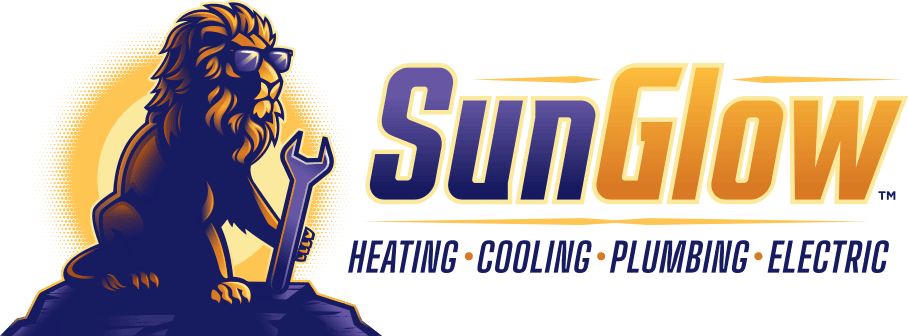Why Is My AC Blowing Hot Air?

There’s nothing more frustrating than expecting a rush of cool air from your vents—only to be met with warm or even hot air. If your air conditioner is blowing hot air, it’s a clear sign that something’s not right.
While some issues are minor and easy to fix, others might point to deeper problems with your system. Here’s a look at the most common reasons your AC might be blowing hot air, how to identify them, and what steps to take to restore comfort to your Portland home, courtesy of Sun Glow Home Services.
- Incorrect Thermostat Settings
- Dirty Air Filters
- Refrigerant Leaks
- Tripped Circuit Breaker
- Dirty or Blocked Condenser Unit
- Electrical or Control Issues
- Frozen Evaporator Coils
Reasons Your AC Is Blowing Warm Air
If your air conditioner is blowing warm air instead of cooling your home, it could be due to a variety of issues. In this section, we’ll explore some of the most common reasons for this problem and what you can do to fix it.
Incorrect Thermostat Settings
Before calling for service, check your thermostat. It might sound simple, but incorrect settings are one of the most common reasons an AC blows hot air. Make sure the thermostat is set to “Cool” and not just “Fan.” If it’s on “Fan,” the system will circulate air without cooling it.
Also, check that the temperature is set lower than the current room temperature. If the display or settings seem off, the thermostat itself may need new batteries or replacement.
Dirty AC Air Filters
A clogged air filter restricts airflow, which can lead to overheating and reduced cooling performance. In extreme cases, your system might shut down the compressor as a protective measure, leaving only the fan running—which results in warm air coming through the vents.
Check your filter and replace it if it looks dirty or hasn’t been changed in the last one to three months. A clean filter is one of the simplest ways to improve both airflow and efficiency.
AC Refrigerant Leaks
Low refrigerant levels are a more serious cause of your AC blowing warm air. Refrigerant is the chemical that absorbs heat from your indoor air and cools it as it cycles through your system. If there’s a leak, your system can’t effectively cool the air.
Signs of a refrigerant issue include hissing sounds, ice on the outdoor unit or refrigerant lines, and reduced airflow. Refrigerant leaks require professional repair—not only to fix the leak but also to safely recharge the system with the proper amount of refrigerant.
AC Tripped the Circuit Breaker
Your AC system has both indoor and outdoor components, and both need to be running properly to cool your Portland home. If the outdoor unit loses power—often because of a tripped circuit breaker—it won’t be able to remove heat from your home.
That means the blower inside may still run, but you’ll only feel warm air. Check your breaker box for any tripped switches and reset them if necessary. If the breaker keeps tripping, it’s best to call a technician to investigate the cause.
Dirty or Blocked Condenser Unit
The condenser unit (typically located outside) releases the heat removed from your Portland home. If it’s clogged with dirt, leaves, or debris, or if the coils are covered in grime, it can’t do its job effectively. This buildup causes the system to overheat, which can result in hot air blowing through your vents.
Regular cleaning of the outdoor unit and the surrounding area can prevent this issue and keep your system running efficiently.
HVAC Electrical or Control Issues
Your AC system relies on a complex network of sensors, wires, and control boards to operate. Faulty wiring, a bad capacitor, or a malfunctioning control board can prevent your system from switching into cooling mode properly.
Diagnosing and fixing these problems typically requires a qualified HVAC technician, as working with electrical components can be dangerous without the right tools and experience.
Frozen Evaporator Coils
When airflow is restricted—often due to a dirty filter or blocked vents—the evaporator coils inside your AC can freeze. As ice builds up, the system can no longer absorb heat, and warm air starts circulating instead.
If you suspect frozen coils, turn off the system to let them thaw. After that, check for airflow problems or call an HVAC technician at Sun Glow Home Services to check refrigerant levels or other underlying issues.
AC Repair vs Replacement: What’s the Right Move?
Once you identify the problem with your AC, the next step is deciding whether to repair it or replace the system altogether.
- For newer systems with isolated issues like a faulty capacitor or clogged filter, repair is typically the smart (and cost-effective) option.
- However, if your system is more than 10–15 years old, experiencing frequent problems, or has a major issue like a failed compressor, replacement may be more economical in the long run.
A new system can offer improved energy efficiency, quieter operation, better indoor air quality and greater peace of mind. Plus, modern AC units come with smart features that make it easier to manage your home’s comfort and energy use.
On the other hand, timely repairs can extend the life of a well-maintained AC system and keep things running smoothly for years.
Don’t Sweat It—Call a Pro
If your AC is blowing hot air, don’t wait until the Portland heat becomes unbearable. Some problems have easy fixes, but others require expert attention. At Sun Glow Home Services, our trained technicians are ready to diagnose the issue, provide honest advice, and get your home cool and comfortable again—fast. Whether it’s a simple tune-up or time for a new unit, we’ve got you covered.
Call 503-610-0418 or request service online for service today and enjoy the peace of mind that comes with a fully functional, reliable cooling system.
